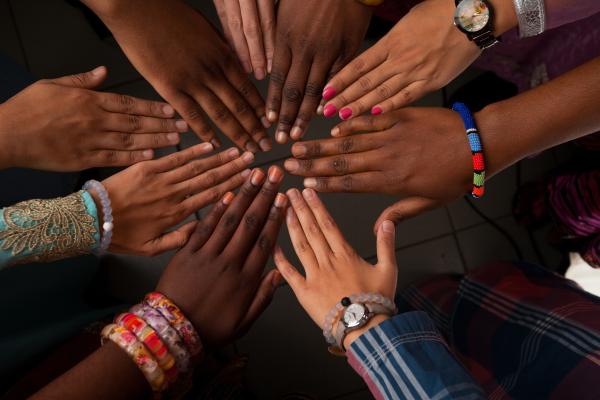S2S Key message 3
This document is a poster used to communicate the S2S services within communities.
 Our global Gender-Based Violence (GBV) team provides strategic technical support to actors across the GBV ecosystem from donors to community-level women-led organisations. We are a multi-disciplinary team delivering programme design and implementation support, advocacy, research reports, MEL and helpdesk services.
Our global Gender-Based Violence (GBV) team provides strategic technical support to actors across the GBV ecosystem from donors to community-level women-led organisations. We are a multi-disciplinary team delivering programme design and implementation support, advocacy, research reports, MEL and helpdesk services.
Our team aspires to apply our feminist principles in all our work and to support sustained and transformative change. We partner with diverse stakeholders and we take an intersectional approach to our work on GBV prevention and response across development and humanitarian contexts.
Our work includes primary prevention programming, community-level response to GBV and SEAH, school-related GBV, GBV in Emergencies, Technology-Facilitated GBV, Violence against LGBTQI+ communities, and GBV in Climate and Economic programming.
Read more about our current work or search our extensive GBV Resource Library below.
This document is a poster used to communicate the S2S services within communities.
This document is a poster used to communicate the S2S services within communities.
This document is a poster used to communicate the S2S services within communities.
This document is a learning product produced by the programme.
This is the Social Development Direct (SDDirect) event brochure for the SVRI Forum 2024. This interactive document, featuring clickable buttons, showcases SDDirect’s global programmes and highlights the key sessions and events where our colleagues and partners will be actively participating. At the Forum, we focus on our work in gender-based violence and safeguarding, addressing critical issues such as feminist approaches to humanitarian action and violence against LGBTQI+ populations.
تهدف هذه الورقة الإرشادية، التي تُحدِّث وتقدم ملخصًا لتقرير أطول عن العنف القائم على النوع الاجتماعي والعمل الاستباقي، إلى أن تكون بمثابة كتاب تمهيدي عن العمل الاستباقي للجهات الفاعلة في مجال العنف القائم على النوع الاجتماعي والجهات التي تدعم تدخلات التخفيف من مخاطر العنف القائم على النوع الاجتماعي. يظل الاستفسار البحثي عن العنف القائم على النوع الاجتماعي والعمل الاستباقي مرجعًا مهمًا للحصول على معلومات أكثر تفصيلاً ويتضمن دراسات حالة، انظر Jay, H. (2021).
Esta hoja de consejos, que actualiza y ofrece un resumen de un informe más extenso sobre la violencia de género y la acción anticipatoria, pretende servir como manual básico sobre la acción anticipatoria para los actores de la violencia de género y para aquellos que apoyan las intervenciones de mitigación del riesgo de violencia de género. La consulta de investigación sobre la violencia de género y la acción anticipatoria sigue siendo una referencia importante para obtener información más detallada e incluye estudios de casos, véase Jay, H. (2021).
Cette fiche de conseils, qui met à jour et résume un rapport plus long sur la violence liée au genre et l'action anticipée, est destinée à servir d'introduction à l'action anticipée pour les acteurs de la lutte contre la violence liée au genre et pour ceux qui soutiennent les interventions d'atténuation des risques de violence liée au genre. La recherche sur la violence liée au genre et l'action anticipée reste une référence importante pour des informations plus détaillées et comprend des études de cas, voir Jay, H. (2021).
تهدف ورقة الإرشادات هذه إلى دعم الجهات الفاعلة في المجال الإنساني بلمحة عامة عن كيفية الحفاظ على نهج يركز على الناجين عند تنفيذ آلية حل مجتمعية. كما أنها تشرح الإجراءات الرئيسية المطلوبة لتقليل المخاطر التي قد تتعرض لها النساء والفتيات اللاتي قد يصلن إلى هذه الآليات.